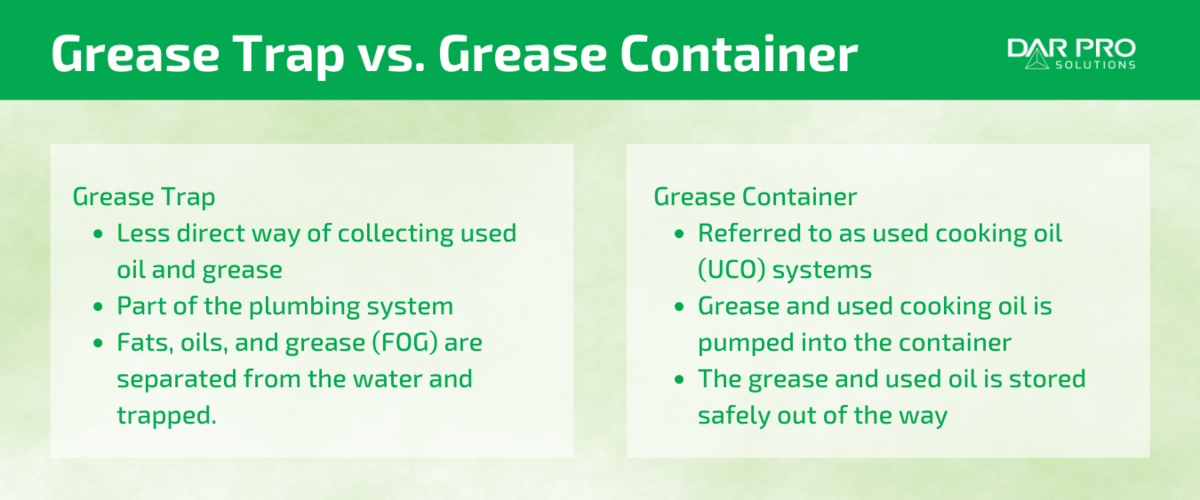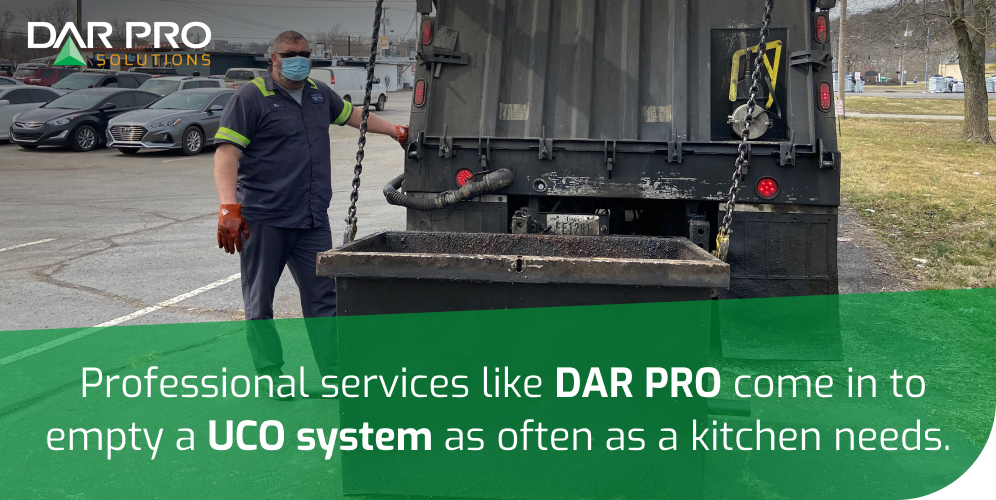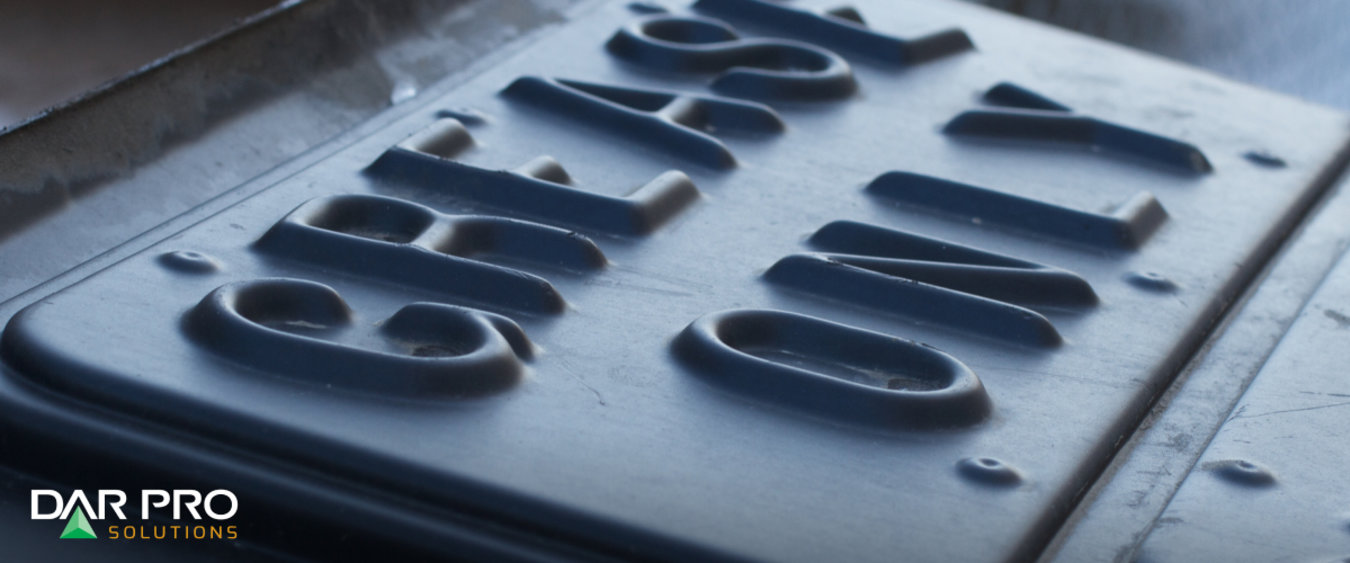What Is a Grease Container?
A commercial kitchen grease container is the large-scale equivalent of the jar on the edge of the sink in your mother’s kitchen. These containers are what we are referring to when we talk about used cooking oil (UCO) systems. Grease and used cooking oil gets pumped into the container either through an automated direct pump system or manual transfer where it gets stored safely out of the way.
True, used cooking oil can go in the trash. However, it’s usually still at a dangerously high temperature when it comes time to dispose of it, making it unsafe to put in the trash. Not only that, but it takes up space in landfills and can damage the environment as it decomposes.
What Is a Grease Trap?
Grease traps are a less direct way of collecting used oil and grease. While kitchen staff should do their best to get food residue in the trash or compost, no one is perfect and some of it ends up going down the drain.
The water will generally be purified and go back into the city’s water supply, but the food waste and grease can’t. This is what grease traps are for.
Grease traps are part of the plumbing system and material that runs through sinks, dishwashers, disposals, floor or other drains ends up there. Fats, oils, and grease, or FOG, are less dense than water. Inside the grease trap, FOG separates, allowing the water to continue down the plumbing and the FOG to be, well, trapped.
Grease containers are sustainable and convenient options for oil disposal, whereas grease traps are required for all kitchens. They need to be installed and regularly cleaned to follow municipality law.

Grease Interceptors
A grease interceptor is very similar to grease traps, and in fact, does the same job. The only difference, really, is the flow rate. A device with a flow rate under 50 gallons per minute is a grease trap, and anything over this is considered a grease interceptor.
Grease interceptor and grease trap sizes depend entirely on the size of the kitchen operation, how large your dish pit is, and how much FOG they produce. Which one you choose depends on some municipal regulations, among other factors. Grease traps are generally the more popular option.
Which one should I use for cooking oil disposal?
Because it is liquid, you might be tempted to pour restaurant cooking oil down the drain, but that should never be an option. Despite the name, grease traps are not actually intended for grease disposal. Once it hardens, grease will stick to the side of your drainage pipes and residue will begin to build up. Just like any other plumbing issue, residue collecting on the side of pipes will eventually build into a clog.
Designated storage for used cooking oil is sustainable, convenient and the most kitchen friendly option for grease disposal.
Grease Trap and Container Maintenance
The key to maintaining any kitchen equipment is regular cleaning. Grease traps are directly connected to wastewater pipes. As mentioned above, if too much FOG and sludge gets built up in the grease trap, some might end up going back into the plumbing. This causes clogs and some major plumbing issues fairly quickly.
Not only that, but the built up from FOG starts to smell. And no one wants their patrons experiencing a foul odor while dining. Put as little food waste down the drain as possible.
Regardless of the system, the only thing that should be poured into used cooking oil containers is fryer oil (no water, trash, etc.). Depending on whether you container is located inside or outside, there are some best practices to ensure your container remains clean, tidy and doesn’t become a liability to your business.
As far as cleaning goes, a professional service like DAR PRO comes in and empties both of them as often as the kitchen needs. However, some basic cleaning and maintenance is also necessary. Traps should be examined periodically for wear and damage and a reputable service provider will make note of any issue during each cleaning service. Depending on the municipality, they may have a cleaning schedule (i.e. one every 90 days) or type of cleaning required. As for UCO systems, some are meant to live outside. They should stand up to the elements well, but always keep an eye on wear-and-tear of these units. Keep the area around them clean, and be ready to clean up oil spills.

DAR PRO UCO Systems
We’ve been cleaning grease traps and collecting used cooking oil for years. The UCO systems we’ve developed are ideal for any commercial kitchen. You have several efficient options for UCO containers, depending on the size and capacity of your kitchen:
Space Saver
The Space Saver is on the smaller end, but still holds up to 198.5 gallons of used cooking oil. This automated option also replaces a classic four foot shelving unit.
DAR PRO also offers an Exterior Space Saver to store used cooking oil outside. This saves space in your kitchen while still offering security from grease theft.
Cleanstar™
The Cleanstar line offers another outdoor solution in the Cleanstar 2500. It holds up to 330 gallons, and can also include a direct pump for pickup.
The Cleanstar 1500 and GRN 1500 are both 180 gallon indoor UCO systems. Both are fully automated, but the GRN 1500 includes heat control.
Fat4Fuel
This storage container is the most compact and economical. The Fat4Fuel system may not be fully automated, but it does include a grease caddy transfer option to safely move used cooking oil into the container.
Outdoor Bin
The DAR PRO’s outdoor bin comes in three sizes, with the Extra Large holding up to 400 gallons. This external UCO system comes with the most secure protection against grease theft.
Talk to DAR PRO About Sustainable Grease Solutions
If you run a kitchen, you’re going to have to do something about grease and used cooking oil. DAR PRO Solutions has your back. We’ll take care of UCO systems installment and collection, as well as grease trap cleaning. Give us a call today at 1-855-710-0465.
DAR PRO Solutions provides safe and efficient used cooking oil recycling solutions to over 130,000 commercial kitchens across the country. Our program reduces hazards within commercial kitchens. Reach out to a DAR PRO representative today and find out how your business can benefit from our program. Call us 24/7/365 at 855-DAR-PRO1 (855-327-7761).
Contact Sales
For customer service inquiries call our toll free number (855) 327-7761
By submitting this form I agree to the privacy policy including the usage of contact details to contact me for marketing purposes.
